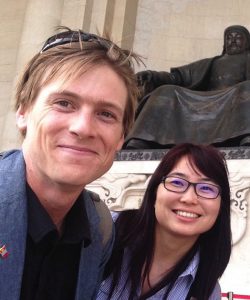Memo #336
By Christopher Carter – cj [at] cj-carter.com and Dulguun Davaanyam – d.dlgn [at] alumni.ubc.ca
 As a former Soviet satellite state, Mongolia has experienced a tremendous transition to free markets and democracy over the past 15 years. Most recently, has been the realization of the country’s vast mineral wealth. In the past decade, foreign investment and mineral development has led to a doubling of the share of extractive industries in Mongolia’s GDP. Yet despite this new wealth, indicators of human development have risen only nominally. We understand today that nations with an abundance of natural extractive resources can experience the so-called “resource curse,” a phenomenon which leads to even less social and economic development outcomes than in resource-limited nations. Meanwhile, excessive dependency on mining can lead to loss of alternative value-added and traditional nomadic economic activities, a phenomenon also known as the “Dutch disease.”
As a former Soviet satellite state, Mongolia has experienced a tremendous transition to free markets and democracy over the past 15 years. Most recently, has been the realization of the country’s vast mineral wealth. In the past decade, foreign investment and mineral development has led to a doubling of the share of extractive industries in Mongolia’s GDP. Yet despite this new wealth, indicators of human development have risen only nominally. We understand today that nations with an abundance of natural extractive resources can experience the so-called “resource curse,” a phenomenon which leads to even less social and economic development outcomes than in resource-limited nations. Meanwhile, excessive dependency on mining can lead to loss of alternative value-added and traditional nomadic economic activities, a phenomenon also known as the “Dutch disease.”
To help address and fend off these concerns, since 2004 Mongolia has been participating in the Extractive Industry Transparency Initiative (EITI). The EITI provides a platform for empowering civil society, ensuring a stable atmosphere for foreign investment and quelling the negative implications of extractive development. In the summer of 2014 we travelled to Mongolia to investigate how the EITI is being implemented there and what challenges it faces at it seeks to mediate and mitigate the country’s growing development of its minerals wealth and the potential “curses” and “diseases” such wealth threatens.
About the Authors:
Christopher Carter is a MASc candidate in Natural Resources Planning at the School of Community and Regional Planning at UBC. His research focuses on multi-stakeholder decision making, regional planning and natural resource policy.
Dulguun Davaanyam is a MASc candidate student at the NBK Mining Engineering department at UBC on the Oyu Tolgoi International Scholarship. Her current research focuses on mine tailings metagenomics and its application in mine remediation and environmental sustainability.